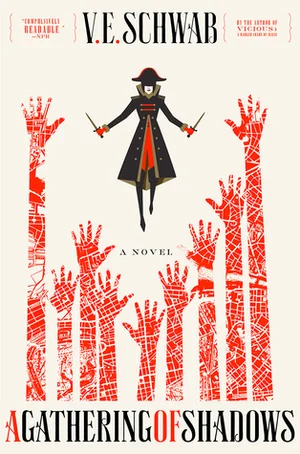Book Review: The Invisible Life of Addie LaRue
Man, where to begin with this one. There was so much build-up for this book, and yet, to be honest, I almost didn’t pick it up. In the end, I couldn’t let a Schwab book slip by me; I’m happy I read it, but…well. Let’s get into it.
In 1714, a young woman named Adeline makes a terrible mistake: she calls to the old gods for aid, and the old gods answer. She makes a bargain without realizing the full extent of the terms, and so finds herself cursed, able to live forever (or at least until she’s ready to give up her soul) but unable to be remembered by anyone once she leaves their presence. And the long centuries begin, years of slipping through history in the white space of the pages, an echo or a dream in the minds of writers and artists. Until, after 300 years, she meets Henry, who can remember her.
The Invisible Life of Addie LaRue is told in two timelines: one in the modern day, where Addie and Henry meet, and one that chronicles the past and Addie’s tumultuous relationship with “Luc,” the old god with whom she made her bargain. There’s also something of a third timeline in Henry’s past (though it’s much abbreviated compared to Addie’s), and Henry has his own modern-day POV chapters too. This is a classic Schwab structure, and it works fairly well overall, though it does drag occasionally.
I’ll be honest and upfront: if you like a healthy dose of plot in your SFF books, this is probably not the book for you. It meanders back and forth through timelines and across centuries, and it does build to the realization of why Henry can remember Addie and what they’re going to do about it, but it takes its sweet time. There’s not a lot of action or stuff happening; the meat of the book takes place in character conversations. It has the qualities I always associate with “literary” books: high quality prose and deep themes, but very little actually happens.
If that kind of book is your thing, you’re going to love Addie LaRue. For me…it’s okay? I like literary SFF now and then, and I didn’t dislike it, and I still got through it quickly. But I didn’t enjoy it on the same level as A Darker Shade of Magic or Vicious, and that’s always going to make me a little disappointed in it.
It has its moments though, to be sure. Schwab is excellent at writing villains, and Luc is captivating — I wanted more of him every time he entered the stage, and Schwab serves him up only in dribs and drabs. The chemistry between Luc and Addie is incredibly strong (to the point where Henry feels like a bit of a let down), and it’s easy to love him and hate him in turns, just as Addie periodically does.
Addie has a little bit of an everywoman quality to her; she’s not anything special other than the strength of her willpower and her desire to not lose what amounts to a centuries-long bet with Luc (and that last is immensely relatable — nobody likes losing). It is fascinating to see how she moves through the centuries and navigates the world, although I could have done with a few less descriptions of her constellation freckles.
This is, sadly, not a big worldbuilding book beyond its central conceit. Personally, I’d have loved to see more of the other supernatural entities that surely roam the earth, but it’s just not that kind of book. It’s too tightly focused on Addie for that to matter.
For what it’s worth, the book takes an interesting turn at the end, once Addie has realized why Henry can remember her. I honestly wasn’t expecting where Schwab took the ending, and it’s nice to know I can still be surprised now and then. She gets a gold star for that.
All in all: liked it, didn’t love it. But I know lots of people who did. It really comes down to the type of story you enjoy, and for me, there wasn’t enough happening for me to really get behind it. But YMMV, especially if you like the literary style.
Grade: 4/5 stars
Memorable Quote:
““I am not some genie, bound to your whim.” He pushes off the tree. “Nor am I some petty forest spirit, content with granting favors for mortal trinkets. I am stronger than your god and older than your devil. I am the darkness between stars, and the roots beneath the earth. I am promise, and potential, and when it comes to playing games, I divine the rules, I set the pieces, and I choose when to play. And tonight, I say no.””







